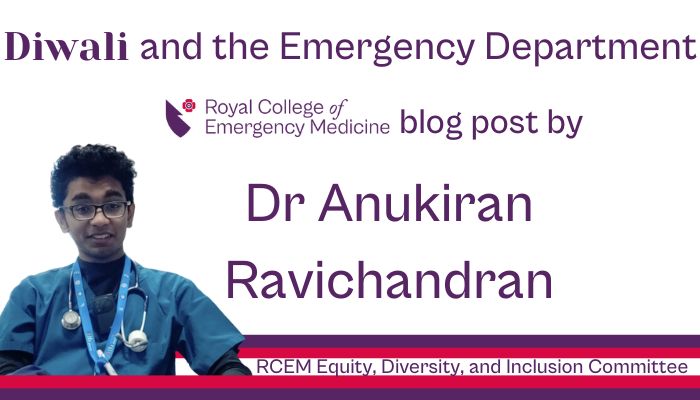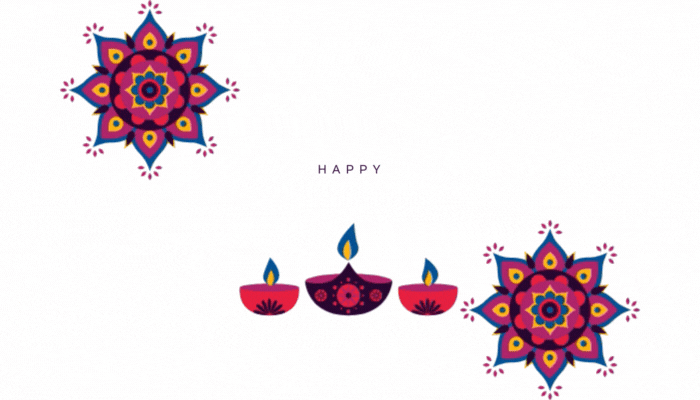Diwali and the Emergency Department: Navigating diversity amidst challenges
Friday 10 November 2023
Dr Anukiran Ravichandran (Kiran), from our Equity, Diversity and Inclusion Committee, writes about the significance of Diwali.

Diwali, the festival of lights, is a time of celebration and reflection for millions around the world. Diwali, also known as Deepavali, holds profound significance in Hinduism. According to the Ramayana, Lord Rama, an avatar of the god Vishnu, was exiled from his kingdom, Ayodhya, for 14 years. During his exile, his wife Sita was abducted by the demon king Ravana. With help of a diverse and unique army, Lord Rama waged a fierce battle against Ravana, ultimately defeating him and rescuing Sita.
Lord Rama’s return to Ayodhya is a pivotal moment in the Ramayana and forms the crux of the Diwali celebration. His return symbolises the victory of righteousness (dharma) over evil (adharma), the triumph of light over darkness, unity in diversity and the restoration of justice. To commemorate Lord Rama’s return, Diwali is marked by various traditions and rituals: homes and public spaces are adorned with colourful rangoli (decorative art created on the ground), diyas (oil lamps), and candles. Fireworks light up the night sky, symbolising the victory of light over darkness. Families come together to share meals, exchange gifts, and seek blessings for a prosperous and harmonious life.
Symbolism for Diwali today
The story of Lord Rama and Diwali holds timeless lessons. In a broader sense, Diwali serves as a reminder for individuals to overcome personal challenges, strive for inner light, and foster a sense of unity, joy, hope and compassion. His resilience and ability to endure hardship contribute to his eventual triumph. Such a timeless message transcends religious boundaries and holds universal appeal. As we observe this significant Hindu festival, it’s important to draw parallels between its themes and the ongoing challenges faced by the emergency department.
In the midst of the darkest moments of medical emergencies, the emergency department serves as a beacon of hope, using their expertise and dedication to illuminate the path to recovery for patients. Just as Diwali signifies the conquest of ignorance and fear, our triumph lies in healing and demonstrating resilience in the face of adversity. We often cope with high-stress situations, unexpected challenges, and demanding work hours. As winter approaches and pressures rise, healthcare teams meticulously plan for the surge in patients, ensuring adequate resources, staffing, and coordination to provide the best possible care.
In the current climate, post graduate doctors in training, such as myself, face novel challenges related to pay and training. Through the strikes, we have demonstrated unity and collective action to bring attention to systemic issues affecting both healthcare professionals and patients. Our actions seek to address challenges collectively, emphasising the importance of a unified voice in advocating for change. We strive to address issues that impact patient care and their own well-being, advocating for a fair and just healthcare environment.
The festival encourages reflection on the triumph of virtue over vice and the continual pursuit of righteousness in our lives The current climate of emergency medicine is characterised by a diverse and dynamic workforce. As the EDI committee, representing emergency physicians globally, we mirror the theme of unity in diversity and foster a culture of inclusivity contribute to a more harmonious work environment. The diversity of its members contributes to a rich tapestry of knowledge and experiences, fostering a collaborative and inclusive environment within the field. In the context of Diwali, we must embody the spirit of illumination, celebration and a commitment to overcoming challenges for the betterment of individuals and communities. To all our members and colleagues – UK and abroad – we wish you all a very happy Diwali.

